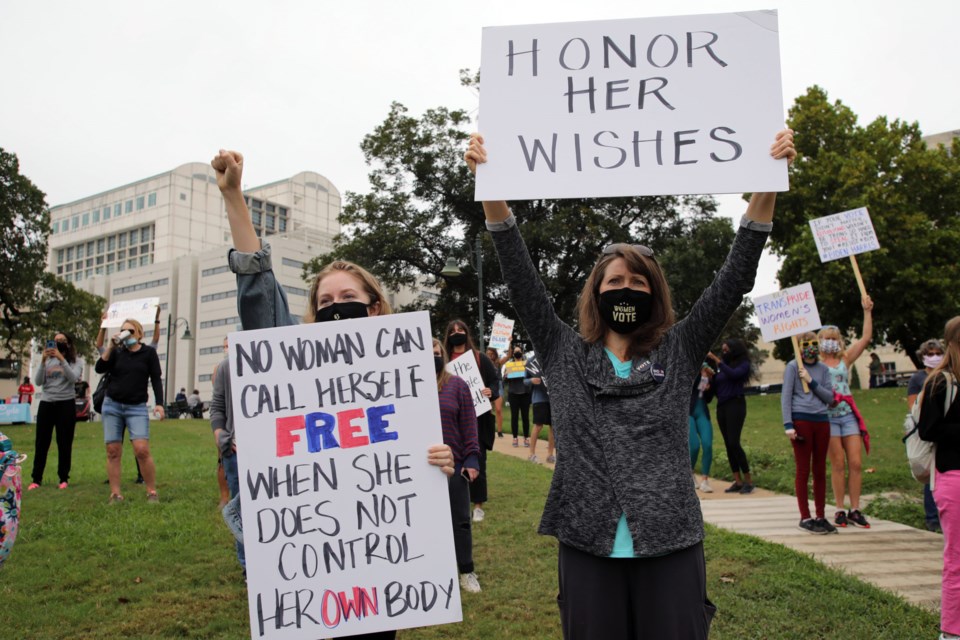The Supreme Court overturned Roe v. Wade on Friday, declaring that the federal constitutional right to abortion no longer exists and henceforth will be determined by the states.
The decision rebukes a federal right that has been upheld for nearly a half century in the United States and is certain to transform the landscape of women's reproductive health in America, moving forward.
At least 21 states already have laws or amendments in place poised to ban abortion as quickly as possible, while others have enacted strict measures regulating the procedure.
There are nine justices on the U.S. Supreme Court, including one Chief Justice. All Justices are nominated by the President of the United States and confirmed by the Senate and hold their offices under life tenure. Six of the current nine justices were appointed by conservative presidents and are considered conservative, including Justices John Roberts, Clarence Thomas, Neil M. Gorsuch, Brett Kavanaugh and Amy Coney Barrett.
There are three liberal justices including, Justices Stephen Breyer, Sonia Sotomayor and Elena Kagan.
In a joint statement, Breyer, Sotomayor and Kagan heavily criticized the majority, writing: "With sorrow -- for this Court, but more, for the many millions of American women who have today lost a fundamental constitutional protection -- we dissent."
However conservative Justice Samuel Alito was part of the majority who struck it down wrote in his majority opinion that the original argument that granted the right to an abortion was "egregiously wrong from the start."
"Its reasoning was exceptionally weak, and the decision has had damaging consequences," Alito wrote. "And far from bringing about a national settlement of the abortion issue, Roe and Casey have enflamed debate and deepened division."
However, one conservative justice-- Chief Justice John Roberts-- did not join the majority, writing that he would not have overturned Roe but instead would have only upheld Mississippi's law banning abortions after 15 weeks.
U.S. Senator Kirsten Gillibrand of New York called the decision "a devastating day for all Americans."
"Today, more than half of the American population became second-class citizens, stripped of their constitutional right to privacy and bodily autonomy, regardless of where they live," Sen. Gillibrand said.
In a May CNN poll conducted immediately after the leak of the draft opinion, Americans said, 66% to 34%, that they did not want the Supreme Court to completely overturn its decision.
In CNN's polling dating back to 1989, 58% of US adults said that, if Roe were overturned, they'd want their state to set abortion laws that were more permissive than restrictive. About half (51%) said they'd like to see their state become a safe haven for women who wanted abortions but couldn't get them where they lived.
"Not only is this ruling an insult to women everywhere, but it is an affront to the 6 in 10 Americans who support women’s reproductive freedom," Gillbrand said "This ruling proves that our judicial system no longer represents the will of the American people and no longer represents logic, science, or equal justice under the law. "
Stripping people of their reproductive rights isn’t pro-life – it’s pro-oppression, wrote the Legal Aid Society in a statement: "This ruling will exacerbate racial inequities and disproportionately harm the most vulnerable and marginalized communities of color who already face obstacles to healthcare. Forcing people to carry unwanted pregnancies to term will push families deeper into poverty and put the lives of pregnant people, many of whom are BIPOC women, at risk."
Several states — among them Mississippi, North Carolina, and Wisconsin — still have decades-old abortion bans on their books; with Roe overturned, those states could revert to a pre-Roe environment. Officials in such states could seek to enforce old laws, or ask the courts to reinstate them.
For example, a Michigan law dating back to 1931 would make abortion a felony. Gov. Gretchen Whitmer, a Democrat, has been working to try to block that law.
Also, Gillibrand wrote that at the state level, they will work to enact pro-choice legislation and flip legislatures to guarantee reproductive rights for all Americans. And in states like New York where reproductive health care is safe and accessible, they will open their doors to those seeking care.
In anticipation that Roe V. Wade might be overturned, on June 3, New York City Councilmember Carlina Rivera of Manhattan, with Councilmembers Rita Joseph and Jennifer Gutiérrez of Brooklyn, introduced new legislation that would guarantee free access to a medication abortion in New York City by anyone.
"We cannot allow nearly 50 years of progress for women’s rights to be erased in one fell swoop," Gillibrand said. "We have simply come too far to turn back now."
Democratic House Chairman, Hakeem Jeffries, of New York agreed:
"Extreme Republicans who continue to block House-passed legislation that protects abortion access nationwide do not want women to have the freedom to make their own health care decisions," Jeffries said.
"In the days and weeks that follow, we will organize the supporters of freedom like never before seen on this deeply personal issue. Vote like your life depends on it because the quality of life for millions of Americans hangs in the balance. The battle lines have been drawn. We will never surrender.”




